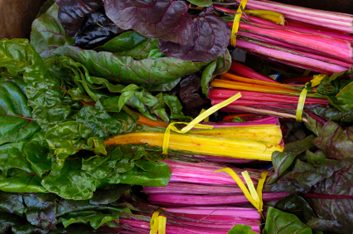
Swiss chard
Swiss chard is a great source of chlorophyll, phytonutrients that may help prevent cancer, and it’s incredibly high in an antioxidant called lutein. “Lutein plays an important role in preventing age-related macular degeneration…the leading cause of blindness in older Canadian adults,” says Gina Sunderland, a registered dietitian in Winnipeg. Next time you shop, skip the pricey, packaged salad greens and reach for an abundant bunch of chard.
“When I buy market-fresh chard, I like to keep it simple,” says Food Network Canada chef Anna Olson, host of Fresh with Anna Olson. She separates the stems and leaves, then sautés the stems with chopped shallots and a touch of oil or butter. She adds a splash of water to make the stems tender, then adds the leaves to barely wilt them.
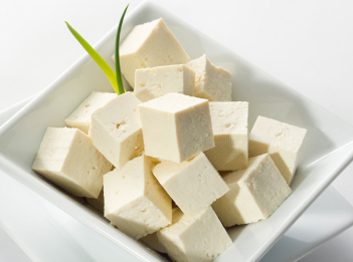
Tofu
Tofu is low in fat and high in protein and isoflavones, which studies show can help protect against hormone-dependent cancers, such as breast cancer and prostate cancer. Some studies indicate isoflavones can also help reduce symptoms of menopause. “Soy is the only plant-based protein that contains the full complement of 21 amino acids, so it can actually replace meat in a diet,” says Sunderland.
Tofu, available in soft, medium and firm varieties, is bland by itself, but readily absorbs other flavours. Blend soft tofu into smoothies or stir-fry firmer varieties with vegetables. For stylish entertaining, Olson suggests sesame-crusted tofu skewers with walnut pesto. Marinate skewered tofu in garlic, soy sauce and rice vinegar, brush with egg white and sesame seeds and bake for five minutes on each side. Serve with toasted walnuts blended with Thai basil, parsley, salt, garlic, ginger, orange zest and olive oil.
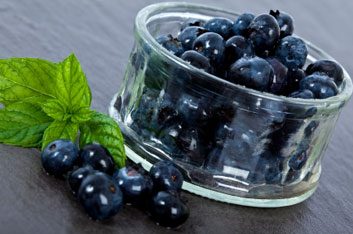
Blueberries
Indigenous to North America, blueberries possess one of the highest antioxidant contents of any fruit or vegetable. Blueberries neutralize free radicals. They contain high levels of anthocyanins, which give the fruit its blue pigment, plus have a beneficial effect on the structure of the cells and tissues in our skin, joints and veins. That means they can protect
against oxidative damage and inflammation-at the root of heart disease, diabetes and cancer.
Consume three cups (750 mL) or more per week of fresh or frozen blueberries.
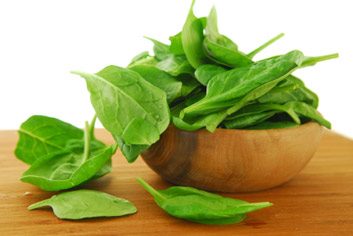
Spinach
It’s hard to beat this green leafy vegetable for vitamins, minerals and antioxidants such as lutein and zeaxanthin. The latter protect against cataracts and macular degeneration, the most common cause of severe vision loss in Canada. High in calcium and vitamin K, spinach is also great for bones.
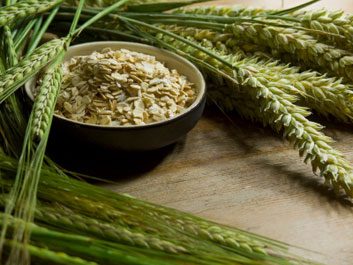
Oatmeal
Add some superfoods to your pantry for the little ones at home. Oatmeal is a healthy breakfast choice, for kids because, unlike many boxed cereals, it’s low in sugar, high in fibre, and free of artificial ingredients. “Oatmeal has been shown to keep people alert longer and keep blood glucose stable longer, [which helps] for learning at school,” says Edie Shaw-Ewald, a registered dietitian in Nova Scotia. “It has also been found to be good for the mood.”
In addition to B vitamins, this humble whole grain contains compounds called beta-glucans, which are linked to lower blood cholesterol and reduced risk for heart disease.
Serve oatmeal with milk or yogurt, topped with fruit. You can also purée uncooked oats into a smoothie or cream-of-broccoli soup, or use them in baking.
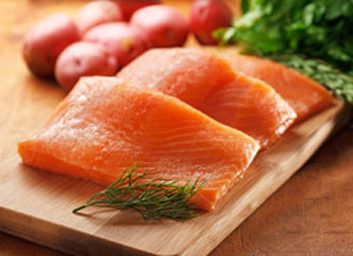
Salmon
Salmon offers omega-3 fats for healthy eyesight and brain development in children. According to EatRight Ontario, kids should have at least two Food Guide servings of omega-3-rich fatty fish, such as salmon, herring and mackerel, per week. “A serving is three ounces, or about the size of a deck of cards,” says Shaw-Ewald.
Canned salmon is a convenient option. Shaw-Ewald recommends making salmon patties, or mixing salmon with pasta and peas for a delicious supper.
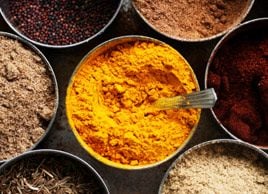
Turmeric
A key spice in South Asian cuisine, turmeric contains curcumin, a polyphenol that produces a yellow colour.
“Turmeric is probably one of the most powerful anti-inflammatory agents ever discovered,” says Dr. Michael R. Lyon, an adjunct professor in the food, nutrition and health program at the University of British Columbia and the director of the Canadian Centre for Functional Medicine, an independent research institute. Because it safely blocks NF-kB-a protein that switches inflammation on and off in the body-the nutrient may help prevent and fight a wide range of diseases, including type 2 diabetes, rheumatoid arthritis, Alzheimer’s disease and multiple sclerosis.

Green Tea
Thanks to its storehouse of polyphenols, green tea is high on the list of skin-friendly beverages. Research from the June 2008 issue of the European Journal of Cardiovascular Prevention & Rehabilitation shows that consumption of green tea has an immediate beneficial effect on cardiovascular health.
Green tea can make antibiotics up to three times more effective in fighting antibiotic superbugs, according to research presented at the Society for General Microbiology‘s 162nd meeting in Edinburgh. Dr Mervat Kassem, the study’s author from the Faculty of Pharmacy at Alexandria University in Egypt, said that green tea enhanced the bacteria-killing activity of antibiotics against 28 different disease-triggering microorganisms.
Aim for four cups throughout the day. If you’re sensitive to caffeine, drink your last cup before three in the afternoon.
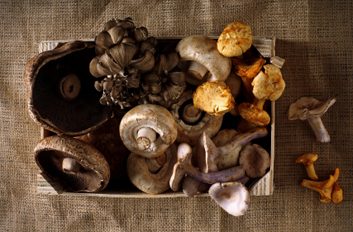
Mushrooms
Increase your vitamin D. Mushrooms are the only fruit or vegetable source of this critical vitamin. Packed with B vitamins, mushrooms will also help you kick up your metabolism. B vitamins are vital for turning food (carbohydrates) into fuel (glucose), which the body burns to produce energy. They also help the body metabolize fats and protein.
A study done on mice and published by the American Society for Nutrition found that white button mushrooms may promote immune function by increasing the production of antiviral and other proteins that are released by cells while they are trying to protect and repair the body’s tissues. A later study showed that these mushrooms promoted the maturation of immune system cells-called dendritic cells-from bone marrow. According to the researchers, this may help enhance the body’s immunity leading to better defence systems against invading microbes.
Related:
• 6 supermarket foods and their health claims: Are they true?
• 5 trendy superfood: Are they worth the cash?
• Does organic mean healthier?
